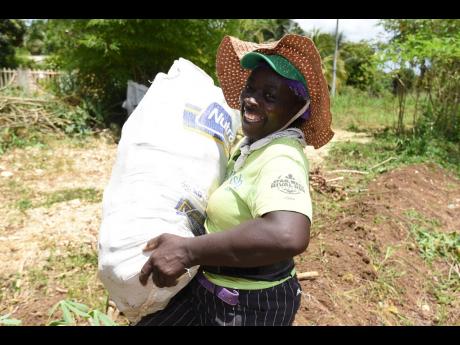Farmer chooses woman power to drive productivity
While some women spend their Saturdays in church or doing some leisure activities, Valrie Thompson can be found on the farm.
When the news team caught up with the 53-year-old on Benneth's Farm in York Street, St Catherine, recently, she was busy toting several bags laden with cassava.
"Is years a started to work here on the farm and I don't mind doing it as I feel independent spending my own money. To be honest, sometimes it (the work) is very difficult, but it have to be done," Thompson said. The mother of three revealed that removing the cassava forms part of her daily duties as she doesn't limit herself.
Meanwhile, her employer, Vynard Benneth, added that Thompson is an asset to the farm and that she is one of five women employed to ensure that productivity continues.
"On this farm I planted about four acres of cassava. This is sold to higglers and a factory in Twickenham Park. But we plant other crops such as sweet potato, sorrel, pumpkin and sugar cane. But a mostly females I use here. I find that them work hard and one of the reliable workers is Valrie," Benneth said. A typical work day starts at 6 a.m.
"We are here today to fill an order for a customer, so that is why Valrie is here working. Farming is a difficult work, but it is what I have been doing from age 17. So at 56 years old I cannot depart from it," Benneth said.
He said that while he got technical training from the Rural Agricultural Development Authority, he got hooked on farming after he sold his first ton of sugar as a teenager.
"I don't remember the price I received, but it (farming) started after I got three squares of land from my father, as he didn't have much. I planted some cane, reap it and sold it to a truck. It was a great feeling to earn a little cash. I don't look back since," he said.
Meanwhile, Thompson said that despite the dirt and grime which comes with tilling the soil, she has no intention of stopping.
"The Government just need to empower the youth and females with training and exposure to funding to help agriculture grow. We still import too much," Benneth said.






































